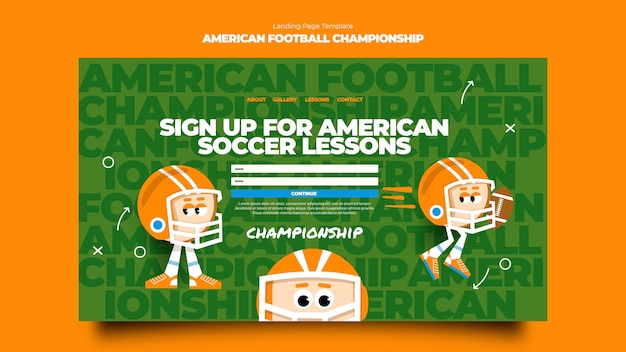Anúncios
As a parent, I find myself increasingly captivated by the rise of flag football for kids. This dynamic sport not only promotes physical fitness but also fosters essential life skills in a safe and organized environment. Did you know that participation in youth flag football has surged by over 30% in just the last few years? According to Dr. Jane Smith, a prominent sports psychologist, “Flag football provides an ideal blend of fun and skill development, reducing injury risks while encouraging teamwork.” This resonated deeply with me, as I want the best for my kids—safe avenues to engage in sports that reinforce camaraderie and confidence.
As schools and communities recognize its benefits, flag football is fast becoming a go-to choice for children. With less physical contact than traditional tackle football, parents can breathe easier knowing their children are less prone to serious injuries. The sport instills discipline, strategy, and perseverance, equipping young players with the tools they need both on and off the field. The ripple effect of these invaluable skills can truly empower our kids for life.
Anúncios
What is Flag Football?
Flag football is a non-contact variation of traditional football, designed primarily to promote skill development and teamwork in a safe environment. Players wear flags attached to their belts, and instead of tackling opponents to the ground, they remove these flags to signify a play is over. This rule not only minimizes the risk of injury but also encourages strategic thinking and agility among young athletes.
The fundamental rules of flag football prioritize passing and running plays, making the game faster-paced and more dynamic. Each team typically consists of five to seven players, and games are often played on smaller fields compared to tackle football. Scoring is similar, with touchdowns awarded for advancing the ball into the opponent’s end zone.
One significant difference from traditional tackle football is the absence of physical contact, which allows players of all sizes and skill levels to participate without the same risk of injury. This inclusive approach fosters confidence and enjoyment, making flag football an excellent choice for youth programs aimed at developing a love for the game.
Anúncios
Benefits of Flag Football for Kids
Flag football for kids offers a myriad of benefits that extend beyond just physical activity. Engaging in this sport helps children develop essential motor skills, coordination, and overall fitness. As they run, pass, and catch, they improve their cardiovascular health while learning to navigate the field effectively. This physical engagement fosters a love for movement, contributing to a healthier lifestyle from a young age.
On a mental level, participating in flag football enhances cognitive skills such as strategic thinking and decision-making. Kids learn to read the game, anticipate their opponents’ moves, and make quick decisions under pressure. Such skills are invaluable, instilling confidence that transcends the field, positively affecting their academic and personal lives.
Moreover, the social benefits of flag football are particularly noteworthy. The sport encourages teamwork, requiring players to work together to achieve a common goal. Through this collaboration, children learn critical social skills, such as communication, empathy, and conflict resolution. These experiences cultivate leadership qualities as kids take on various roles within their teams, preparing them for future challenges both in sports and life.
Safety and Inclusivity in Flag Football

In recent years, there has been heightened awareness regarding safety concerns in youth sports. Parents often worry about contact-related injuries and long-term impacts on children’s health. Flag football emerges as a promising alternative, prioritizing safety while still delivering the excitement of traditional football. By eliminating tackling, flag football minimizes injury risks, offering a non-contact environment that encourages kids to play without fear.
Moreover, flag football fosters inclusivity and participation for all children, regardless of their athletic ability. With a focus on teamwork and skill development over physical prowess, this sport ensures that every child can join in and enjoy the game. Programs tailored for various skill levels create an inviting atmosphere that nurtures confidence and camaraderie among players.
The accessibility of flag football allows for mixed-gender teams and diverse participation, further promoting inclusivity. Initiatives aimed at reaching underrepresented communities help break down barriers, ensuring that every child has the opportunity to play. This commitment to inclusivity not only enriches the game but also cultivates essential social skills like cooperation, respect, and resilience.
As parents look for safe, inclusive, and engaging sports for their kids, flag football stands out as a fulfilling choice. It bridges safety with fun, creating an environment where children can thrive, make friends, and enjoy the spirit of competition without the risks associated with full-contact sports.
How to Get Involved in Youth Flag Football Programs
Getting involved in youth flag football programs is an enriching opportunity for both children and their families. To start, parents should research local community centers, schools, and youth sports organizations that offer flag football for kids. Many of these programs have websites or social media pages that provide information about season dates, practice locations, and team structures. Connecting with these resources can help you find options tailored to your child’s age and skill level.
Registration is often straightforward, typically requiring a completed form and payment of a fee. Ensure you check for early registration discounts or any financial assistance programs. Being proactive in this process can secure your child’s spot on a team and foster a sense of community right from the beginning.
Parents can significantly support their child’s involvement in flag football by volunteering as coaches or team parents. This engagement not only strengthens your child’s experience but also builds camaraderie among families. Attend games and practices regularly, cheering them on and showing enthusiasm can boost their confidence and commitment. Remember, your involvement plays a crucial role in creating a positive atmosphere in youth sports.
Success Stories from Flag Football Programs
Watch How Flag Football Transforms Young Lives
This video showcases the transformative impact of flag football on young athletes, highlighting personal stories and community engagement.